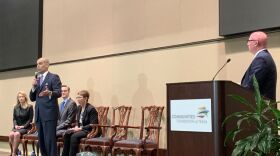More than 4,000 students in the Dallas Independent School District are homeless. With no permanent place to call home, life can be stressful. That’s why homeless advocates say exposing kids to positive experiences is so important. One summer camp at the University of Texas at Dallas is doing just that.
It's graduation day at Kids' University. Inside a classroom at the University of Texas at Dallas, kids line up in a single file line. They’re donning caps and gowns in a rainbow of colors.
Nine-year-old Santana Sanchez is sporting a shiny green ensemble.
“I’m excited and nervous because I get to go on stage,” he said.
This annual four-day camp is held for homeless kids from Dallas and Collin counties. Students ages 4 to 14 are introduced to robotics, algebra and get to build life skills — like making new friends.
Their backgrounds are varied. Some of the kids come from shelters for domestic violence or sex trafficking victims. Some have been removed from their families out of safety concerns. And some live in motels.
“But the thing that’s in common for all of them is that they do not have a home and we want them to have an experience just like any other kids where they’re out of the shelter learning," said Kelly Wierzbinski, the director of children, youth and family services at Rainbow Days, the nonprofit agency that runs the camp.
Rainbow Days teams up with the Dallas Independent School District’s homeless education program to provide transportation.
“We have it a on a college campus to let them know it’s within their reach," Wierzbinski said. "They see UTD students … it just helps break that ice that it is attainable.”
The kids call her Ms. Kit Kat, since her name begins with K.
Wierzbinski says some of these students have a hard time talking about their family or housing situation. And they’re dealing with far more than their peers.
“It’s very difficult for them to get enough sleep," she said. "They are worried five times more than the regular child about something bad happening and those are the things you really can’t see, but we know it’s happening.”

This camp gives students like Aliyiah White a break from all of that. Aliyiah is headed to the fifth grade in the fall. Currently, she lives at a Salvation Army shelter with two of her sisters. She says it’s fine, the people at the shelter help families get back on their feet. But it’s not the same as having a regular home.
"Sleep. Good food. Clean restrooms. That's what I miss," Aliyiah said.
She said she loves Kids University: "Because you don't go through stress at camp," she said.
One day, campers got a visit from some snakes, lizards and spiders from the Perot Museum.
“We played with the animals. We danced. And it was fun," Aliyiah said. "We got stress off of us by dancing. Dancing the stress off.”
Santana Sanchez, with the green cap and gown, said he's liked learning stuff that that will help him in the classroom.
"You get to have fun, but also you get to do math," he said. "It like gives you memory of math so you remember when you go back to school."
Santana lives in housing run by Exodus Ministries. It's a non-denominational Christian organization that helps reunite women who have been incarcerated, like his mom, with their kids.
“Most of my life I haven't got to live with her and she hasn’t been in my life,” he said.
Before the graduation ceremony, the kids sing along to music and get a pep talk from camp organizers.
For Santana, Aliyiah, and their classmates, walking across that stage is a reminder of what they’re capable of — regardless of the struggles they face.








